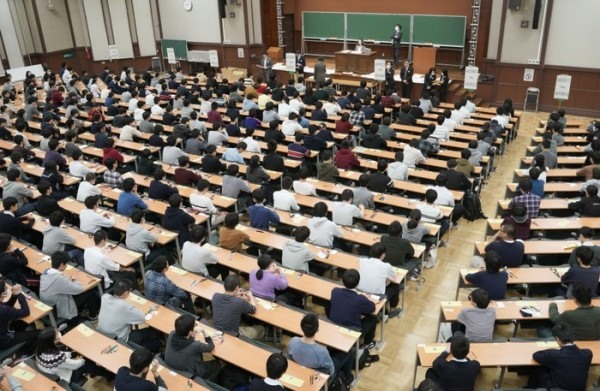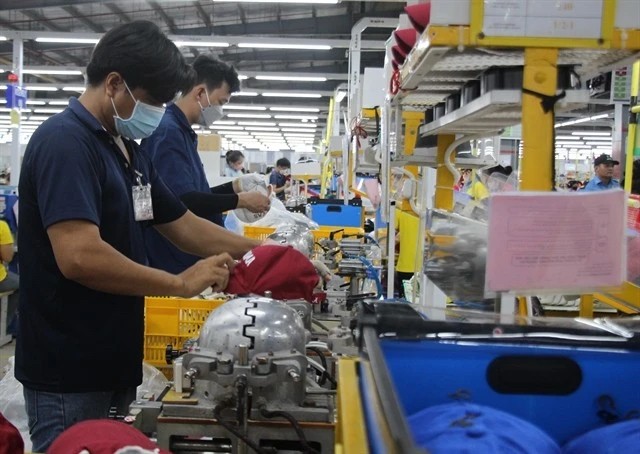Japan to tighten rules over foreign university students enrollment
 |
Students attend a lecture at a Japanese university. KYODO File Photo
The move comes as the country prepares to accept 300,000 foreign students by 2020 under a program that aims to increase awareness about Japan.
The Japan’s ministry and the Immigration Services Agency will disclose the names of universities they find to have breached rules around the enrollment of foreign students and ban them from accepting any more.
The decision was prompted by the case of the Tokyo University of Social Welfare, which was investigated by the government for losing touch with a huge number of its foreign students.
The Japan’s Ministry of Education, Culture, Sports, Science and Technology said it told the school Monday to stop accepting new foreign students on preliminary courses.
“The university bears a huge responsibility for the large number of missing students and illegal aliens,” said education minister Masahiko Shibayama at a news conference.
In the three years since the 2016 academic year, the university lost contact with 1,610 foreign students, saw 700 cancel their enrollment and removed 178. A large proportion of the students were enrolled in Japanese-language courses as part of a preliminary program to be completed before they advanced to degree programs.
The ministry and the immigration agency inspected the university’s four campuses in Tokyo and other cities five times between March and May and found it had been accepting many students who did not have sufficient language skills or were unable to pay tuition fees.
They also discovered the university was short-staffed and failed to provide support to students who had missed classes over a prolonged period.
The ministry said it will consider reducing or withdrawing subsidies for the private university, while the agency will reject visa applications from foreign students who seek to enroll there.
The Tokyo University of Social Welfare, founded in 2000, had been accepting relatively few foreign students for years but expanded the number to about 1,200 in the 2016 academic year, about 1,900 the following year and over 2,600 in the year ended this March.
A Vietnamese official in Tokyo told Vietnam News the Tokyo University of Social Welfare is a special case because it provides a prep course, mostly to improve Japanese proficiency, for students hoping to go on to formal courses at universities and colleges.
“Japanese higher education institutions require N1 or N2 – the highest levels on the Japanese language competency test – and those with basic command of the language, N4 or N5 levels, can apply to these prep courses to get to the required levels,” the official said, adding that the Tokyo school may have lax admission criteria and accept a lot of foreign students
Many international students are discouraged by the difficulty of the prep courses and decide not to continue. In some cases, they find that the facilities or teachers are not up to par, so they opt to work and earn money to send home instead.
The problem at the university in question maybe that they have not been thorough in the management of the student body, the official said. They may take attendance infrequently or fail to maintain updated contact details, meaning it could take a long time for the institution to notice that a significant portion of the students have stopped showing up to classes.
Yuriko Sato, an associate professor at the Tokyo Institute of Technology who specializes in foreign student policy, called for more public support for foreign students, saying universities have been accepting students without sufficient language skills.
She said if poorly performing language schools can be brought up to a better standard and have their subsidies increased to help free students from their busy part-time jobs, Japan can “create an environment in which foreign students can focus on studies without worries.”
Vietnam’s education ministry signed a memorandum of co-operation with the Japanese justice and education ministries on the management of Vietnamese students and trainees in Japan, under the witness of Prime Minister Nguyen Xuan Phuc and Japanese Prime Minister Shinzo Abe last October.
There are currently are about 170,000 Vietnamese students studying abroad in 40 countries. Most are self-funded, and Japan remains the most popular destination./.
VNF/Kyodo/VNS
Recommended
 National
National
Vietnam News Today (Jun. 6): Foreign Investment in Vietnam Surges in Five Months
 National
National
Vietnam News Today (Jun. 5): PM sets off for attendance at UNOC 3 in France, official visits to Estonia, Sweden
 National
National
Vietnam News Today (Jun. 4): Vietnam - Promising Candidate for Southeast Asia’s Next Powerhouse
 National
National
Shangri-La Dialogue 22: Vietnam Highlights Some Issues of Ensuring Stability in a Competitive World
 National
National
Vietnam News Today (Jun. 3): PM Pham Minh Chinh to Attend UN Ocean Conference, Visit Estonia, Sweden
 National
National
Vietnam News Today (Jun. 2): Vietnamese Trade Mission Sounds Out Business Opportunities in United States
 National
National
Vietnam News Today (Jun. 1): Vietnamese, Japanese Firms Foster Partnership
 National
National
